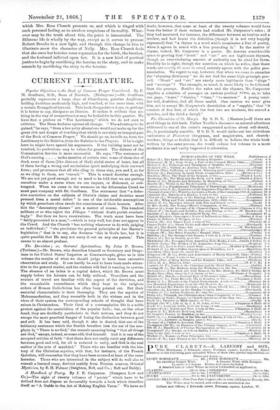CURRENT LITERATURE.
Popular Objections to the Book of Common Prayer Considered. By E. M. Goulburn, D.D., Dean of Norwich. (Rivingtons.)—Dr. Goulburn probably represents a large class of Churchmen, genuine Anglicans, holding doctrines moderately high, and touched, at the same time, with a certain Evangelical fervour. This book disappoints a hope, or, perhaps it is better to say, dissipates an illusion. It makes it evident that no- thing in the way of comprehension may be looked for in this quarter. We have first a preface on " The Lectionary," which wo do not care to criticize. The Dean declares against all change. " The advantage to be gained," he says, " from a few petty alterations would not make up for the great risk and danger of touching that which is certainly an integral part of the Book of Common Prayer." We should go on, he tells us, from the Lectionary to the Rubrics, from the Rubrics to the Prayers. If he is right here he might have spared his arguments. If the building must not be touched, its perfections may bo taken for granted. Tho defence of the Commination Service is more successful. He says, "The sentences of God's cursing . . . . make mention of certain sins; some of them sins of deed, some of them (like distrust of God) sinful states of heart, but all of them having a wrong and unchristian spirit underlying their outward form ; and pronounce that all who cling to these sins, you and I, so far as we cling to them, are cursed.' " This is sound doctrine enough. We are not yet good enough not to need to be told that we are puttiug ourselves under a curse when we are impure, or dishonest, or evil- tongued. When we come to the sermons on the Athanasian Creed we must part company with Dr. Goulburn. The statement that "a defec- tive conviction on the subjects of Christ's claims and doctrine must proceed from a moral defect " is one of the intolerable assumptions by which preachers often revolt the consciences of their hearers. After this the " damnatory clauses " are a matter of course. The hundred millions or so who reject the Filioque " without doubt perish everlast- ingly." But then we have reservations. The truth must have been " fairly presented to a man,"—which is very well, but does not appear in the Creed. And the Church "has nothing whatever to do with judging an individual ;" "she proclaims the general principles of her Master's legislation ;" that is to say, she declares this is God's law, but it is quite possible that He may not carry it out on any one person.' This seems to us almost profane.






































 Previous page
Previous page